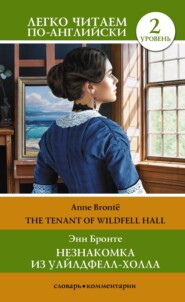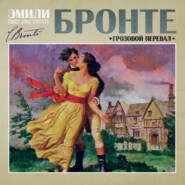По всем вопросам обращайтесь на: info@litportal.ru
(©) 2003-2025.
✖
Wuthering Heights
Автор
Год написания книги
2019
Настройки чтения
Размер шрифта
Высота строк
Поля
‘At Thrushcross Grange,’ he answered, ‘and I would have been there too, but they had not the manners to ask me to stay.’
‘Well, you will catch it!’ I said, ‘you’ll never be content till you’re sent about your business. What in the world led you wandering to Thrushcross Grange?’
‘Let me get off my wet clothes, and I’ll tell you all about it, Nelly,’ he replied.
I bid him beware of rousing the master, and while he undressed, and I waited to put out the candle, he continued –
‘Cathy and I escaped from the wash-house to have a ramble at liberty, and getting a glimpse of the Grange lights, we thought we would just go and see whether the Lintons passed their Sunday evenings standing shivering in corners, while their father and mother sat eating and drinking, and singing and laughing, and burning their eyes out before the fire. Do you think they do? Or reading sermons, and being catechised by their manservant, and set to learn a column of Scripture names, if they don’t answer properly?’
‘Probably not,’ I responded. ‘They are good children, no doubt, and don’t deserve the treatment you receive, for your bad conduct.’
‘Don’t you cant, Nelly,’ he said. ‘Nonsense! We ran from the top of the Heights to the park, without stopping – Catherine completely beaten in the race, because she was barefoot. You’ll have to seek for her shoes in the bog tomorrow. We crept through a broken hedge, groped our way up the path, and planted ourselves on a flower-pot under the drawing-room window. The light came from thence; they had not put up the shutters, and the curtains were only half closed. Both of us were able to look in by standing on the basement, and clinging to the ledge, and we saw – ah! it was beautiful – a splendid place carpeted with crimson, and crimsoncovered chairs and tables, and a pure white ceiling bordered by gold, a shower of glass-drops hanging in silver chains from the centre, and shimmering with little soft tapers. Old Mr and Mrs Linton were not there. Edgar and his sister had it entirely to themselves; shouldn’t they have been happy? We should have thought ourselves in heaven! And now, guess what your good children were doing? Isabella – I believe she is eleven, a year younger than Cathy – lay screaming at the farther end of the room, shrieking as if witches were running red hot needles into her. Edgar stood on the hearth weeping silently, and in the middle of the table sat a little dog, shaking its paw and yelping, which, from their mutual accusations, we understood they had nearly pulled in two between them. The idiots! That was their pleasure! to quarrel who should hold a heap of warm hair, and each begin to cry because both, after struggling to get it, refused to take it. We laughed outright at the petted things, we did despise them! When would you catch me wishing to have what Catherine wanted? or find us by ourselves, seeking entertainment in yelling, and sobbing, and rolling on the ground, divided by the whole room? I’d not exchange, for a thousand lives, my condition here, for Edgar Linton’s at Thrushcross Grange – not if I might have the privilege of flinging Joseph off the highest gable, and painting the house-front with Hindley’s blood!’
‘Hush, hush!’ I interrupted. ‘Still you have not told me, Heathcliff, how Catherine is left behind?’
‘I told you we laughed,’ he answered. ‘The Lintons heard us, and with one accord, they shot like arrows to the door; there was silence, and then a cry, “Oh, mamma, mamma! Oh, papa! Oh, mamma, come here. Oh, papa, oh!” They really did howl out, something in that way. We made frightful noises to terrify them still more, and then we dropped off the ledge, because somebody was drawing the bars, and we felt we had better flee. I had Cathy by the hand, and was urging her on, when all at once she fell down.
‘“Run, Heathcliff, run!” she whispered. “They have let the bull-dog loose, and he holds me!”
‘The devil had seized her ankle, Nelly; I heard his abominable snorting. She did not yell out – no! She would have scorned to do it, if she had been spitted on the horns of a mad cow. I did, though: I vociferated curses enough to annihilate any fiend in Christendom, and I got a stone and thrust it between his jaws, and tried with all my might to cram it down his throat. A beast of a servant came up with a lantern, at last, shouting –
‘“Keep fast, Skulker, keep fast!”
‘He changed his note, however, when he saw Skulker’s game. The dog was throttled off, his huge, purple tongue hanging half a foot out of his mouth, and his pendant lips streaming with bloody slaver.
‘The man took Cathy up; she was sick; not from fear, I’m certain, but from pain. He carried her in; I followed, grumbling execrations and vengeance.
‘“What prey, Robert?” hallooed Linton from the entrance.
‘“Skulker has caught a little girl, sir,” he replied, “and there’s a lad here,” he added, making a clutch at me, “who looks an out-and-outer! Very like, the robbers were for putting them through the window, to open the doors to the gang, after all were asleep, that they might murder us at their ease. Hold your tongue, you foulmouthed thief, you! you shall go to the gallows for this. Mr Linton, sir, don’t lay by your gun.’
‘“No, no, Robert!” said the old fool. “The rascals knew that yesterday was my rent day; they thought to have me cleverly. Come in; I’ll furnish them a reception. There, John, fasten the chain. Give Skulker some water, Jenny. To beard a magistrate in his strong-hold, and on the Sabbath, too! where will their insolence stop? Oh, my dear Mary, look here! Don’t be afraid, it is but a boy – yet, the villain scowls so plainly in his face, would it not be a kindness to the country to hang him at once, before he shows his nature in acts, as well as features?”
‘He pulled me under the chandelier, and Mrs Linton placed her spectacles on her nose and raised her hands in horror. The cowardly children crept nearer also, Isabella lisping –
‘“Frightful thing! Put him in the cellar, papa. He’s exactly like the son of the fortune-teller, that stole my tame pheasant. Isn’t he, Edgar?”
‘While they examined me, Cathy came round; she heard the last speech, and laughed. Edgar Linton, after an inquisitive stare, collected sufficient wit to recognise her. They see us at church, you know, though we seldom meet them elsewhere.
‘“That’s Miss Earnshaw!” he whispered to his mother, “and look how Skulker has bitten her – how her foot bleeds!”
‘“Miss Earnshaw? Nonsense!” cried the dame, “Miss Earnshaw scouring the country with a gipsy! And yet, my dear, the child is in mourning – surely it is – and she may be lamed for life!”
‘“What culpable carelessness in her brother!” exclaimed Mr Linton, turning from me to Catherine. “I’ve understood from Shielders”’ (that was the curate, sir) ‘“that he lets her grow up in absolute heathenism. But who is this? Where did she pick up this companion? Oho! I declare he is that strange acquisition my late neighbour made in his journey to Liverpool – a little Lascar, or an American or Spanish castaway.”
‘“A wicked boy, at all events,” remarked the old lady, “and quite unfit for a decent house! Did you notice his language, Linton? I’m shocked that my children should have heard it.”
‘I recommenced cursing – don’t be angry, Nelly – and so Robert was ordered to take me off – I refused to go without Cathy – he dragged me into the garden, pushed the lantern into my hand, assured me that Mr Earnshaw should be informed of my behaviour, and bidding me march, directly, secured the door again.
‘The curtains were still looped up at one corner; and I resumed my station as spy, because, if Catherine had wished to return, I intended shattering their great glass panes to a million fragments, unless they let her out.
‘She sat on the sofa quietly. Mrs Linton took off the grey cloak of the dairy maid which we had borrowed for our excursion, shaking her head, and expostulating with her, I suppose; she was a young lady and they made a distinction between her treatment and mine. Then the woman servant brought a basin of warm water, and washed her feet; and Mr Linton mixed a tumbler of negus, and Isabella emptied a plateful of cakes into her lap, and Edgar stood gaping at a distance. Afterwards, they dried and combed her beautiful hair, and gave her a pair of enormous slippers, and wheeled her to the fire, and I left her, as merry as she could be, dividing her food between the little dog and Skulker, whose nose she pinched as he ate; and kindling a spark of spirit in the vacant blue eyes of the Lintons – a dim reflection from her own enchanting face – I saw they were full of stupid admiration; she is so immeasurably superior to them – to everybody on earth, is she not, Nelly?’
‘There will more come of this business than you reckon on,’ I answered, covering him up and extinguishing the light. ‘You are incurable, Heathcliff, and Mr Hindley will have to proceed to extremities, see if he won’t.’
My words came truer than I desired. The luckless adventure made Earnshaw furious – And then, Mr Linton, to mend matters, paid us a visit himself, on the morrow; and read the young master such a lecture on the road he guided his family, that he was stirred to look about him, in earnest.
Heathcliff received no flogging, but he was told that the first word he spoke to Miss Catherine should ensure a dismissal; and Mrs Earnshaw undertook to keep her sister-in-law in due restraint, when she returned home; employing art, not force – with force she would have found it impossible.
CHAPTER 7 (#ulink_5d4beae1-3330-5897-bfb7-2976462bf3f5)
Cathy stayed at Thrushcross Grange five weeks, till Christmas. By that time her ankle was thoroughly cured, and her manners much improved. The mistress visited her often, in the interval, and commenced her plan of reform by trying to raise her self-respect with fine clothes and flattery, which she took readily: so that, instead of a wild, hatless little savage jumping into the house, and rushing to squeeze us all breathless, there lighted from a handsome black pony a very dignified person, with brown ringlets falling from the cover of a feathered beaver, and a long cloth habit which she was obliged to hold up with both hands that she might sail in.
Hindley lifted her from her horse, exclaiming delightedly,
‘Why, Cathy, you are quite a beauty! I should scarcely have known you – you look like a lady now – Isabella Linton is not to be compared with her, is she, Frances?’
‘Isabella has not her natural advantages,’ replied his wife, ‘but she must mind and not grow wild again here. Ellen, help Miss Catherine off with her things – Stay, dear, you will disarrange your curls – let me untie your hat.’
I removed the habit, and there shone forth beneath, a grand plaid silk frock, white trousers, and burnished shoes; and, while her eyes sparkled joyfully when the dogs came bounding up to welcome her, she dare hardly touch them lest they should fawn upon her splendid garments.
She kissed me gently – I was all flour making the Christmas cake, and it would not have done to give me a hug – and, then, she looked round for Heathcliff. Mr and Mrs Earnshaw watched anxiously their meeting, thinking it would enable them to judge, in some measure, what grounds they had for hoping to succeed in separating the two friends.
Heathcliff was hard to discover, at first – If he were careless, and uncared for, before Catherine’s absence, he had been ten times more so, since.
Nobody but I even did him the kindness to call him a dirty boy, and bid him wash himself, once a week; and children of his age seldom have a natural pleasure in soap and water. Therefore, not to mention his clothes, which had seen three months’ service in mire and dust, and his thick uncombed hair, the surface of his face and hands was dismally beclouded. He might well skulk behind the settle, on beholding such a bright, graceful damsel enter the house, instead of a rough-headed counterpart to himself, as he expected.
‘Is Heathcliff not here?’ she demanded, pulling off her gloves, and displaying fingers wonderfully whitened with doing nothing, and staying indoors.
‘Heathcliff, you may come forward,’ cried Mr Hindley, enjoying his discomfiture and gratified to see what a forbidding young blackguard he would be compelled to present himself. ‘You may come and wish Miss Catherine welcome, like the other servants.’
Cathy, catching a glimpse of her friend in his concealment, flew to embrace him; she bestowed seven or eight kisses on his cheek within the second, and, then, stopped, and drawing back, burst into a laugh, exclaiming.
‘Why, how very black and cross you look! and how – how funny and grim! But that’s because I’m used to Edgar and Isabella Linton. Well; Heathcliff, have you forgotten me?’
She had some reason to put the question, for shame and pride threw double gloom over his countenance, and kept him immoveable.
‘Shake hands, Heathcliff,’ said Mr Earnshaw, condescendingly; ‘once in a way, that is permitted.’
‘I shall not!’ replied the boy, finding his tongue at last, ‘I shall not stand to be laughed at, I shall not bear it!’
And he would have broken from the circle, but Miss Cathy seized him again.
‘I did not mean to laugh at you,’ she said, ‘I could not hinder myself. Heathcliff, shake hands, at least! What are you sulky for? It was only that you looked odd – If you wash your face, and brush your hair, it will be all right. But you are so dirty!’
She gazed concernedly at the dusky fingers she held in her own, and also at her dress, which she feared had gained no embellishment from its contact with his.
‘You needn’t have touched me!’ he answered, following her eye and snatching away his hand. ‘I shall be as dirty as I please, and I like to be dirty, and I will be dirty.’

















